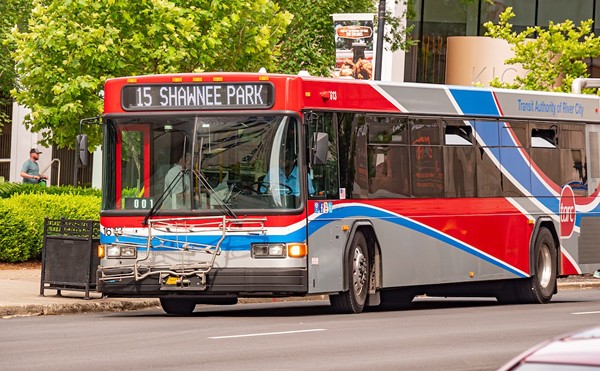Pop Quiz: What city has 390,000 energy consumers who could soon be saddled with a 12 percent overall rate hike, has no controlling stake in its power utilities, and isn’t Düsseldorf, Germany?
That’s right, it’s Louisville, Ky. Possibility City. Mayor Jerry Abramson held a press conference last week to discuss the potential sale of LG&E by German parent company E.ON U.S. Like everybody else, Jerry heard about E.ON’s possible plans to sell on the news.
Addressing the public and the energy barons who’d forgotten to call and who refused comment on the rumor, the mayor requested that, when the time comes, the people of Louisville and the commonwealth of Kentucky be given a seat at the negotiating table and a shot at acquiring LG&E and Kentucky Utilities. Good for him.
Let’s consider some of the fundamentals of global free market capitalism. There’s a product. The product is sold to people who want or need it. If the seller is a corporation whose shareholders believe they’re entitled to a steady, continuous increase in annual revenue, the consumer will be asked to ante up over and over again. If a monopoly is in place, the consumer will be forced to fulfill the expected windfall profits … over and over again. The first priority, indeed the only directive of a corporation, is to create profit for its shareholders. Full Stop.
Concerning recent maneuvering by LG&E to raise base rates for consumers, E.ON President and CEO Vic Staffieri echoed every other press release on the matter by saying: “The base rate increase is, in large part, associated with covering the costs to meet the energy demands of our customers.”
I draw your attention to the conspicuously vague phrase, “in large part.” What is implied by these dumb little words is that there is a small part that ought not concern you, namely the expectation of E.ON’s shareholders to make something like $8.8 billion in profits last year, one kilowatt hour at a time.
Yes, it is the duty of utility providers to build, repair and maintain infrastructure and services. Yes, the cost of these duties is inevitably reflected in the cost to the consumer. Yes, rate hikes can become necessary to address natural disasters, price fluctuation and growing demand.
No, I don’t feel I should give you some more money just because you want it, you fucking fascist bully.
For E.ON, there are only gains and losses. Breaking even is the same as losing money. But if the actual public — or at least a group whose mandate was our collective interest — owned the public utilities, profit would cease to be an issue. Keeping the lights on would become the only priority, and it could be done locally, and more cheaply.
If Louisville has a chance to put its own interests and those of its neighbors before those of a faceless conglomerate that has no vested interest in this community, we should jump on it. With the world falling down around us, self-reliance and self-determination are showing themselves to be of utmost importance.
If the sale actually moves forward, the Kentucky Public Service Commission will open a case to determine the fitness of any potential buyers, faceless conglomerate Duke Energy being the probable front-runner. It is the statutory duty of the Public Service Commission, in conjunction with the state attorney general, to thoroughly vet any potential buyers and determine that a sale would be in the interests of the general rate payers, i.e. you and me.
Luckily for us, a study conducted by the Mayor’s Office in 2004 determined the acquisition of LG&E/KU by Metro Government and/or the commonwealth was feasible. More than likely it is feasible still.
What has to happen now, especially in an election cycle, is a big-ass public debate. Make sure to mercilessly probe mayoral candidates and any other public officials you can get your mitts on about their positions on the matter.
When (and only when) a petition for the sale of LG&E/KU is formally brought before the Public Service Commission, it is incumbent upon us to jam the phone lines of the attorney general’s office and the Public Service Commission, demanding that the mayor’s request for a presence at the bargaining table be recognized.
Don’t lose these numbers.
• Attorney General Jack Conway: 502-696-5300.
• Kentucky Public Service Commissioners David Armstrong, James Gardner and Charles Borders: 800-772-4636.





